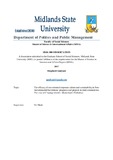Please use this identifier to cite or link to this item:
https://cris.library.msu.ac.zw//handle/11408/3313| Title: | The efficacy of eco-oriented corporate culture and sustainability in NonGovernmental Institutions’ programs and projects in rural communities: the case of Chipinge district, Manicaland, Zimbabwe | Authors: | Gudyani, Shepherd | Keywords: | Environmental protection Global governance Development |
Issue Date: | 2017 | Publisher: | Midlands State University | Abstract: | Concerns about environmental protection and sustainability have recently become more significant in global governance and development. This has seen many attempts through conventions and forums trying to look into solutions that conserve and protect the environment as the source of global development. Even in the international affairs, the control over the environment and land has also become a stampede and one of the vital determinants of power matrix among global states. With calls for careful planning towards the achievement of global development (through the Millennium Development Goals (MDGs), the focus on environment has become key, thus prompting many questions as to how the environment is being used and sustained; how initiatives of development are seeking to restore the dignity of this present and future resource. Also with the proliferation of Non-Government actors in development initiatives which directly operate on the environment, such quest has also become more important. This research seeks to analyse the efficacy of eco-oriented corporate practices of Non-Governmental Organizations (NGOs) in programs and projects they implement in rural communities of Zimbabwe. While analysing eco-orientation, this research also analyses the importance of sustainability in those programs and projects. Focus of this research is on a 3 tier Enhancing Nutrition, Stepping up Resilience and Enterprise (ENSURE) program being implemented by World Vision International Zimbabwe (WVIZ) in Chipinge rural community of Manicaland Province (Zimbabwe). This research strives to asset whether eco-oriented corporate culture in NGOs’ operations is either a potent determinant of their position in institutionalised political economy and their adherence to the popular global demand for development and environmental sustainability within international affairs or that their mission is a pseudo dressing of the above context. This paper is also determined to establish whether NGOs could leverage on an eco-oriented corporate culture as a key organizational array to match the precepts of institutionalised perspective of international development, their zeal to deliver development and influence the broader policies of nation-states in addressing environmental problems currently being faced Zimbabwe and whole world at large. | URI: | http://hdl.handle.net/11408/3313 |
| Appears in Collections: | Master of Science in International Affairs Degree |
Files in This Item:
| File | Description | Size | Format | |
|---|---|---|---|---|
| MSIA 800 DISSERTATION - SHEPHERD GUDYANI CORRECTED COPY.pdf | Full Text | 3.2 MB | Adobe PDF |  View/Open |
Page view(s)
220
checked on Feb 14, 2026
Download(s)
102
checked on Feb 14, 2026
Google ScholarTM
Check
Items in MSUIR are protected by copyright, with all rights reserved, unless otherwise indicated.



